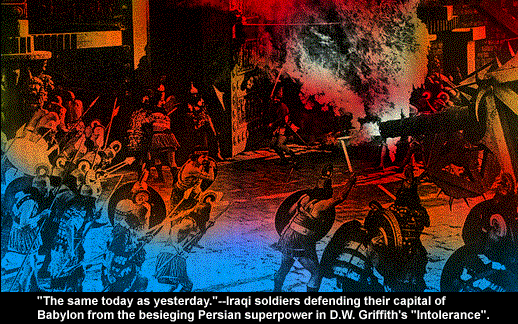HOLLYWOOD'S ANSWER TO WAR


|
BY WILLIAM M. DREW
Hollywood is often associated with the imagery of militarism -- Bob Hope supporting the war effort, John Wayne defeating the enemy single-handedly. But from its earliest days, the motion picture community has produced films that have made strong statements against war and its brutality. And some of its leading figures have put their careers on the line by decrying the move towards war. D.W. Griffith, the great director who more than any one man shaped the future of the American film, spoke out against war throughout his career. His Civil War epic, THE BIRTH OF A NATION, dramatizes the devastation of war and occupation. While the storm over its representation of the blacks in the Reconstruction Era has for many clouded the anti-war element in the film, the controversy at least serves to illustrate Griffith's belief that wars create more problems than they solve. His magnum opus, INTOLERANCE, which includes a depiction of the conquest of Babylon (modern Iraq) by the world's first superpower, Persia, is an antiwar spectacle of such immense proportions that it continues to stir audiences around the world. Pacifist messages also color BROKEN BLOSSOMS by juxtaposing the gentle Chinese hero with the brutal white pugilist, and ISN'T LIFE WONDERFUL? by portraying the wrenching poverty in post-World War I Germany. The director even managed to inject an anti-war motif into his World War I propaganda film, HEARTS OF THE WORLD. In 1936, Griffith was the first signer of the "People's Mandate to End War," a peace movement based in Washington, D.C. that gathered millions of signatures from around the world for an anti-war petition sent to the Inter-American Peace Conference in Buenos Aires. Griffith's anti-war sentiments may have influenced his contemporaries. The silent screen's premier comedienne, Mabel Normand, who had earlier worked for Griffith, promoted a peace movement on the eve of the United States' involvement in the First World War. Mary Pickford and Lillian Gish, two of Griffith's greatest dramatic stars, also expressed pacifist views over the years. Miss Gish, who said she regretted the propagandistic function of HEARTS OF THE WORLD which she made for Griffith in 1917-1918, in 1941 spoke and wrote eloquently against further US involvement in war. Griffith's fervor against war was matched by his chief rival, Thomas H. Ince, whose elaborate anti-war allegory, CIVILIZATION, is credited with having helped re-elect Woodrow Wilson on the slogan, "He kept us out of war."
The US involvement in World War II and its Cold War aftermath, transforming the nation into a global superpower, shattered Hollywood's tradition of pacifism both on and off screen. Not only did propaganda films return with a vengeance, spokespersons for peace were intimidated. In the twenties and thirties, a time of relative peace, Will Rogers remained a universally-beloved figure even as he criticized contemporaneous "frontier" skirmishes involving the Marines in various countries. But in the forties and fifties, Lillian Gish was threatened, Lew Ayres was boycotted, Charlie Chaplin was exiled, Paul Robeson was blacklisted and, for a time, Maurice Chevalier, was persona non grata, all because they had spoken out against war.
[continue]
|
Introduction copyright ©1991,
1998-2001 by William M. Drew.
All rights reserved.
[home | top of the page]
![]()